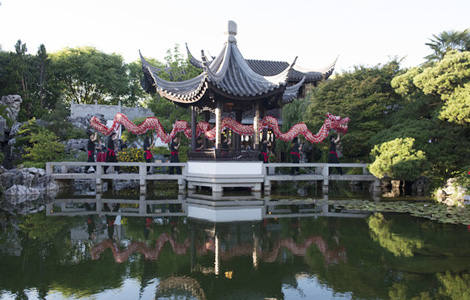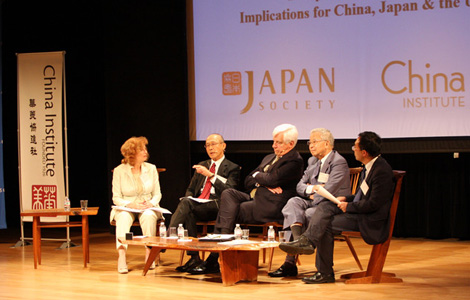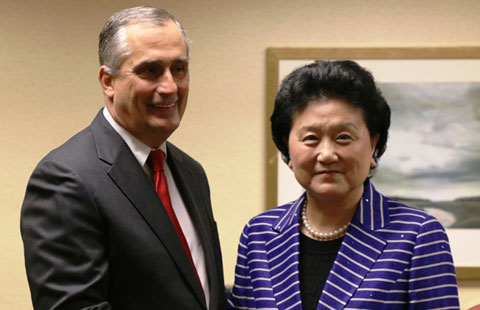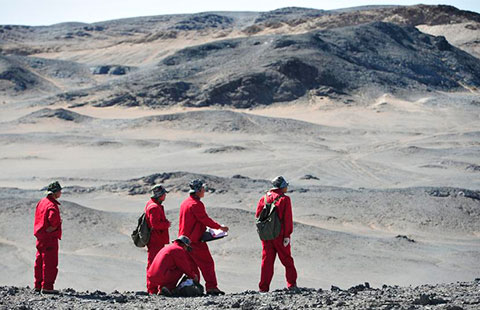More than 'greet' and 'meet'
Updated: 2015-06-19 11:21
By Chen Weihua(China Daily)
|
||||||||
No miscalculation
During his visit to Washington last week, Fan urged the US to reduce its military activities in the air and waters of the South China Sea. Many Chinese believe that it was the US which emboldened countries such as the Philippines and Vietnam to adopt a more confrontational stance in the maritime territorial disputes there.
There has also been serious concern on both sides about a possible accident caused by misunderstanding and miscalculation when Chinese and US militaries operate in close proximity, especially following the 2001 collision of the US EP-3 spy plane and a fighter jet of the People's Liberation Army off China's Hainan Islands, causing the death of a Chinese pilot.
Fan and Carter promised last week that the two sides will strive to reach an agreement on a code of conduct regarding military encounters in the air-to-air annex by August, before Xi's visit to the US.
Fan and the Chinese government are still upset at the US Justice Department's indictment a year ago of five PLA officers for alleged cyber espionage, resulting in the suspension of a bilateral working group on cyber security set up about two years ago. They also have called it irresponsible for US officials to name China as the culprit for the recent hacking into the White House Office of Personnel Management before any serious investigation.
While the US has expressed concern over alleged Chinese cyber espionage regarding US corporate secrets, China said the US should reduce and stop its wide-ranging espionage against China as revealed by Edward Snowden, a former contractor for the National Security Agency (NSA).
China has argued that its guidelines for IT security equipment used in banks, which has raised eyebrows in the US in the past months, are for the sake of national security. Many Silicon Valley IT firms have been found to be willingly and unwillingly collaborating with the NSA, according to Snowden's revelations.
Schools of thoughts
There has been a lot of noise regarding how the US should react to the rise of China. In the report Revising the US Grand Strategy Toward China, Robert Blackwill of the Council on Foreign Relations and Ashley Tellis of the Carnegie Endowment for International Peace, argued for a tougher US stance.
"Because the American effort to 'integrate' China into the liberal international order has now generated new threats to US primacy in Asia - and could result in a consequential challenge to American power globally - Washington needs a new grand strategy toward China that centers on balancing the rise of Chinese power rather than continuing to assist its ascendancy," they wrote.
In a report released in April - US-China 21: The Future of US-China Relations under Xi Jinping - Kevin Rudd, the former Australian prime minister, argued that despite difficulties, the US-China relationship remains in decidedly positive territory.
Rudd, a fluent Mandarin speaker, said developing a common strategic narrative for US-China relations may be difficult, but it is certainly not impossible. And given the stakes involved for the future, it is increasingly necessary, he added.
While the US has accused China of trying to topple the current global governance system and China said it is only seeking to reform the system to reflect the new reality of emerging economies, Rudd said no one should assume that the current order cannot be radically improved.
"The uncomfortable truth is that our existing system of global governance, anchored in the United Nations (UN) and the Bretton Woods institutions, is becoming increasingly dysfunctional. We can see this in its cumbersome response to the great global security, economic, social and environmental challenges of our time," he wrote.
"For this reason, no one should assume, a priori, that a greater Chinese role in the order is by definition detrimental. That is simply not the case. The question is whether the unfolding dynamics in US-China relations will result in an international system that is better or worse than the present one, warts and all."
Cooperation has indeed been growing despite differences and sometime rivalry. China and US militaries have stepped up military-to-military exchanges and cooperation in the past two years, including more high-level visits and joint exercises.
The PLA Navy for the first time participated in the Rim of Pacific Exercise (RIMPAC) war games last year. And Fan last week invited Carter and Admiral Harry Harris, the new commander of the US Pacific Command, to visit China.
On the economic front, many Chinese still see the Trans-Pacific Partnership (TPP) as a US scheme to cut China out of the Asia supply chain, as argued by Columbia University Nobel laureate Joseph Stiglitz early this year. Some Chinese officials and pundits have expressed interest in understanding the TPP and weighing the pros and cons of a potential participation in the currently snagged trade negotiation among 12 countries.
Obama was dealt a major blow last Friday by Democrats in the House of Representatives when he tried to lobby for Trade Promotion Authority (TPA) that would allow the White House to fast-track trade talks, without which a conclusion of the negotiation looks impossible.
The US suffered a major setback two months ago trying to persuade its allies not to join the China-led Asia Infrastructure Investment Bank (AIIB), only to see allies from Asia to Europe, such as Britain, Australia and South Korea, joining the new bank as founding members. But US officials have since changed their rhetoric by welcoming the new institution, which the US is not considering joining now.
China has also drawn much attention with the launch of the Belt and Road Initiative, originally known as the land-based Silk Road Economic Belt and oceangoing Maritime Silk Road, aimed at developing connectivity and cooperation among countries, mostly developing nations. Such a move, while being warmly applauded by many, has been seen by some in the US as a threat to US influence.
Daly, of the Kissinger Institute, said the US should indicate that it welcomes a constructive Chinese role in shaping the international environment and providing international public goods.
"It could do this by expressing support for the 'One Belt One Road' initiative, provided that the program is carried out in a transparent manner, with input from civil society groups in participating countries, and with respect for environmental impacts and labor and human rights," he said.
In meeting Fan last week, US National Security Advisor Susan Rice expressed that the US is paying great attention to communication and coordination with China on global issues such as Iran's nuclear program, counter-terrorism, climate change and the fight against deadly Ebola.
After receiving much praise for the climate deal reached last November during Obama's visit in Beijing, many hope both China and the US will continue to show leadership during the S&ED and the days leading to the UN Climate Change Conference in Paris late this year, when a legally binding and universal agreement on climate is expected for all nations.
Progress of BIT
Key on this year's S&ED agenda will also be the Bilateral Investment Treaty (BIT), which concluded its 19th round of negotiations in Beijing last week.
In an April speech in Washington, Sheets, the Treasury undersecretary, dismissed the characterization of the BIT talks as slow. He cited the broad and far-reaching content being discussed and expressed optimism about making meaningful progress in a relatively short period of time.
The US is China's top trade partner with bilateral trade exceeding $550 billion in 2014, while China trails Canada as the second-largest trade partner for the US.
Many believe the BIT will unlock huge new opportunities for bilateral investment and trade. The US hopes China would further open up its service sector to foreign investment, and the Chinese want the US to treat the growing number of Chinese investors in the US in a fair manner and not use national security as an excuse to block their entry into the country. Investment by Chinese telecom equipment giant Huawei Technology has hit that roadblock many times with US elected officials describing the company as a possible national security concern.
A report released in May by the Rhodium Group and the National Committee on US-China Relations showed that Chinese companies are operating in 340 of the 435 US congressional districts, employing more than 80,000 Americans.
Contact the writer at chenweihua@chinadailyusa.com
Most Viewed
Editor's Picks

|

|

|

|

|

|
Today's Top News
More than 'greet' and 'meet'
Innovation competition marks 10th anniversary
Obama suggests more gun control after shooting
Talks seen as prelude to visit by President Xi to US in September
The most costly cities for expats
House passes fast-track trade bill
Gunman kills nine people in South Carolina church shooting
US House moves to revive Obama's Pacific trade pact
US Weekly

|

|















